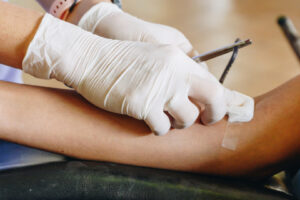The LGBTQ+ population faces many social, economic, and emotional barriers that discourage them from seeking healthcare services, putting them at risk for certain health problems. From lack of insurance and access to care to outright discrimination, these disparities make it vital for clinicians to offer a safe, non-judgmental environment that encourages open and honest communication at every stage of care.
“Members of the LGBTQ+ community are less likely to go to regular doctors for routine screenings because they may not feel safe or comfortable being honest about their lifestyle,” says Jaclyn Guliano, MD, MS, FAAFP, board-certified family medicine physician at Family Practice of CentraState. “They may have had bad prior experiences with a doctor or medical facility that had a lasting impact. They sometimes don’t even want to do telemedicine visits because of privacy issues.”
Speaking to your doctor about your sexual identity and sexual behaviors is the first step to ensuring your doctor can help you get the healthcare that you need and deserve. Early detection and prevention of disease are paramount to a healthy life. Dr. Guliano shares different health concerns and screenings you should know and discuss with your own trusted physician.
Cancers
Women of the LGBTQ+ community may be at higher risk for certain cancers. There is a higher risk for breast cancer and endometrial cancers in women with fewer lifetime pregnancies and lower rates of breastfeeding, both of which have historically affected the LGBTQ+ community for various reasons. Lesbian women and transgender males are also less likely to seek out preventative gynecological screenings, which can lead to increased risks for cervical and ovarian cancer. It’s important to ensure all eligible individuals get regular pelvic examinations, Pap smears, and mammograms.
Gay and bisexual men should be also be screened for HPV and anal cancers. Although rare, it’s possible to develop cancers from certain hormone treatments. Due to higher rates of smoking in the LGBTQ+ community, there is also an increased risk for lung cancer.
Heart Health
Cardiovascular disease is a concern across the spectrum in the LGBTQ+ community. According to the American Heart Association, smoking, alcohol use, lower physical activity levels, obesity, sleep issues, and chronic stress play a role in higher rates of high blood pressure and heart disease, particularly in lesbian women and bisexual men. Transgender women and men may also be at increased risk for cardiovascular diseases including strokes and blood clots due to side effects of hormones such as estrogen and testosterone. This is why it is important not only to be frequently monitored but also to ensure medication is coming from a knowledgeable provider.
Diabetes
Lesbian women and transgender individuals experience higher rates of obesity, a risk factor that increases their chance of developing diabetes. When unmanaged, diabetes can be life-threatening and can cause serious complications.
Physical Screenings
Regular screenings to prevent, detect, and control risk factors for these and other medical conditions are recommended for all LGBTQ+ patients. Screenings may include:
- Blood pressure and heart rate screening
- Height and weight checks for body mass index
- Blood tests for cholesterol, triglyceride, and glucose levels
- Urine tests for glucose and protein levels, bacteria, blood cells, and more
- STI screenings
- Medication and hormone treatment monitoring
- Immunizations
- Mammograms
- Gynecological and anal exams
- Lung, prostate, testicular, and colon cancer screenings
- Exercise and diet counseling
Mental Well-Being
Mental health screenings are important for your overall well-being, too, especially if you experience depression, anxiety, substance abuse, or other mental health issues. Increased stress from being subjected to violence, harassment, discrimination, or struggling with sexuality issues can factor into your mental well-being, and your doctor can help you get the resources you need to cope.
“It is our responsibility to become an ally and an advocate to each patient, know what to look for, and break down barriers of communication,” says Dr. Guliano. “The goal is to encourage every patient to be the healthiest version of themselves, whoever they are.”
CentraState is doing its part to help break down these barriers to care with its LGBTQ+ Inclusion Committee, an employee-led workgroup dedicated to inclusivity in the hospital setting.
“We are working hard to provide a setting where all members of the community can access important care and screenings that they need and receive compassionate, quality care in an environment free from discrimination,” says Emily (Remy) DeMarco, MSN, RN, emergency room nurse and leader of the committee.





